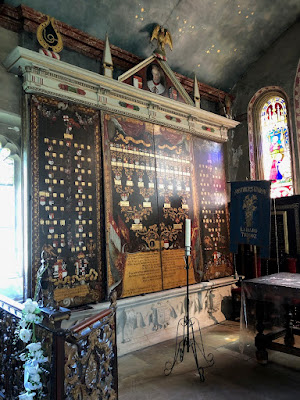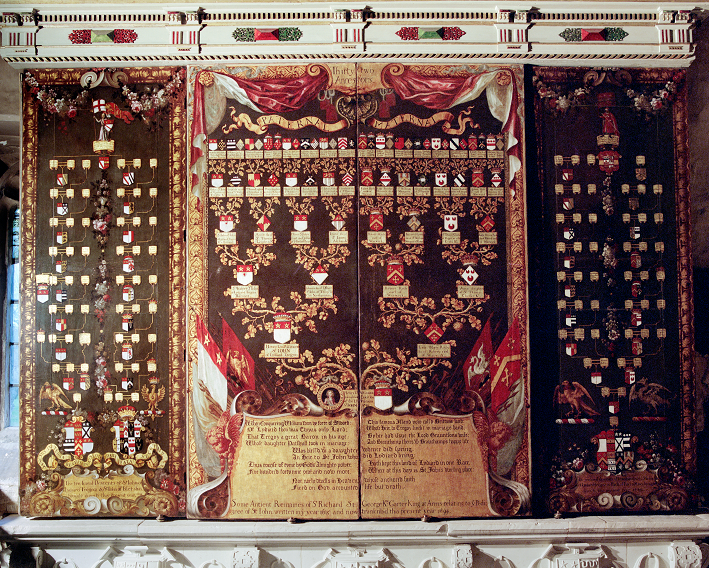Today, in the week of the release of her new book*, I am delighted to turn the blog over to author Elizabeth St John:
***************************************
The King’s Intelligencer
Discovering the Bones of the Princes in the Tower
 |
| The White Tower |
The inspiration for The King’s Intelligencer grew from my research for The Godmother’s Secret, which delves into the enduring mystery of the missing princes in the Tower of London. Edward V and his younger brother, Richard, Duke of York, vanished in 1483, with most historians believing they were murdered by their uncle, Richard III. This historical puzzle has fascinated scholars and writers for centuries, and I became captivated by it as I unearthed primary sources while writing my novel. But, while I was firmly fixed on the medieval mystery of the missing princes, another story emerged, which took place in my beloved seventeenth century.
A whisper of an idea for The King’s Intelligencer occurred during a visit to Westminster Abbey, where I stood before the Chapel of the Innocents. In this chapel lies a white marble urn, designed by Sir Christopher Wren and commissioned by King Charles II in 1675. Installed in 1678, the urn supposedly contains the remains of the two princes. According to the inscription, the young royals were murdered on the orders of their "perfidious uncle Richard the Usurper" and secretly buried in the Tower of London. Their bones, unearthed almost two centuries later, were placed in this beautiful monument.
As I stood near the urn, reflecting on my St.John and Apsley family—the historical inspiration for my novel’s characters—I began to question the legitimacy of the bones’ discovery. Sir Allen and Frances Apsley, parents of my King’s Intelligencer protagonist Franny Apsley, are buried only a few steps from the princes' tomb. This proximity suddenly connected my family's history and the national intrigue surrounding the princes' fate. Were these really the remains of Edward V and his brother, Richard? Or was the discovery in 1674 a politically convenient find for King Charles II to secure his throne amid religious and political turmoil? The Apsleys moved closely within the circle of Charles and his brother James. What would they have thought of the discovery?
I delved deeper into historical research. Notably, Helen Maurer’s paper "Bones in the Tower: A Discussion of Time, Place and Circumstance" and Annette Carson’s article "The Bones in the Urn" both challenge the accepted narrative. Maurer identifies inconsistencies in the timing, location, and identification of the remains, while Carson questions whether the bones truly belonged to the princes.
This scepticism becomes more compelling when viewed through the lens of 17th-century politics. Charles II’s reign was marked by intense religious divisions between Protestants and Catholics. Although Charles publicly adhered to Protestantism, he had Catholic sympathies, eventually converting to Catholicism on his deathbed. His brother, James II, was openly Catholic, leading to his ousting during the Glorious Revolution of 1688. The discovery of the princes' bones in 1674 conveniently allowed Charles II to present himself as a restorer of justice after the supposed crimes of his "usurper" ancestor, Richard III.
By connecting himself with the long-overdue justice for the murdered princes, Charles II reinforced his legitimacy at a time when his Catholic inclinations could have jeopardized his rule. The discovery of the bones symbolized more than an ancient crime solved; it was a strategic move to bolster public support and distance the Stuarts from accusations of tyranny and religious subversion. The timing of the find raises suspicions about whether the bones were used to manipulate public perception and political power.
My research into this political landscape also uncovered a hidden layer of intrigue. The Secret Treaty of Dover, a clandestine pact between Charles II and Louis XIV of France, revealed Charles’s promise to declare himself Catholic in exchange for financial support. This treaty, kept secret for years, highlights the delicate balance of power in 17th-century England and allowed me to blend national concerns into the Apsley family's personal history.
In such an environment of political manoeuvring, espionage was a vital tool. Spies, or intelligencers, operated covertly, often without official sanction. This secretive world provided the perfect setting for my protagonist, Franny Apsley, as she navigates the web of espionage, hidden alliances, and betrayal in 17th-century England.
Franny's family had real-life connections to espionage. Her parents, Allen and Frances, along with her cousin Nan Wilmot, Countess of Rochester, engaged in covert activities during and after the English Civil War. Nan famously outwitted Oliver Cromwell to protect her Royalist interests, and Franny’s brother, Peter Apsley, worked as an intelligencer for Charles II and James II. This family history fuelled the espionage elements in The King’s Intelligencer, as I imagined Franny following in her family’s footsteps. Research at Lydiard Park further revealed fascinating links to historical artifacts, such as the Great Painting and the Grandison Book, which provided inspiration for Franny’s investigation in the novel.
 |
| The Great Painting (also above left) |
But what of the bones? Even if modern DNA testing were permitted, the remains may have deteriorated too much to yield definitive answers. And even if they are proven to be those of the princes, crucial questions—like the cause of death and the identity of their murderer—would remain unanswered. The mystery endures, leaving both historians and novelists to speculate.
The King’s Intelligencer weaves together historical fact and fiction, following Franny Apsley on a perilous quest to uncover the truth about the missing princes. The novel not only explores the mystery of their remains but also delves into the political machinations of the time, blending real history with family intrigue to offer a fresh perspective on the princes in the Tower and the complex web of power in 17th-century England.
Footnote:
The full inscription of Sir Christopher Wren’s urn, translated from the Latin, reads as follows:
Here lie the relics of Edward V, King of England, and Richard, Duke of York. These brothers being confined in the Tower of London, and there stifled with pillows, were privately and meanly buried, by the order of their perfidious uncle Richard the Usurper; whose bones, long enquired after and wished for, after 191 years in the rubbish of the stairs (those lately leading to the Chapel of the White Tower) were on the 17th day of July 1674, by undoubted proofs discovered, being buried deep in that place. Charles II, a most compassionate prince, pitying their severe fate, ordered these unhappy Princes to be laid amongst the monuments of their predecessors, 1678, in the 30th year of his reign.










